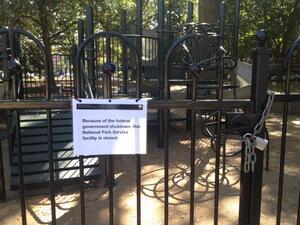National Shutdown
The government shut down is on everyone’s mind—as it should be. Day two and we are all holding our collective breath. As of right now, I’m safe from the effects, but my family isn’t. My sister—a federal employee—is home, without pay, busy cleaning her basement when she should be out there making the world a better place.
My sister isn’t the only woman feeling the burn. Slate took a look at the ways the government shut down is impacting women in an article entitled Seven Ways the Government Shutdown Will Hit Women Hardest. Programs like the Special Supplemental Nutrition Program for Women, Infants and Children (WIC) and Temporary Assistance to Needy Families (TANF) are included on the list of "non-essential" government services shut down during the stand off.
Sitting here outside of Washington DC it’s easy to get frustrated. There doesn’t feel like much we can do besides watch from afar. Our lunchtime discussion today was alive with discussions of letters to Representatives and our desire for action. Still, it’s easy to get bogged down in feeling frustrated—no matter your political convictions.
A friend shared with me his plan to donate to a food pantry to help those who rely on WIC—and urged me to encourage others to do the same. Interestingly enough, this response isn’t unprecedented. Historically the Jewish community has played a prominent role in providing social services to fill the gaps of government assistance.
Take a look at our Living the Legacy lesson on workers and their allies. Within the lesson there is a great example of landsmanschaften, or aid societies, designed to help new immigrants to America.
Or, take a look at Lillian Wald, a Jewish woman who took the initiative to found the Henry Street Settlement in New York’s Lower East Side. The Henry Street Settlement provided meals, education, and cultural lessons for those new to America.
Before regulations or government programs like WIC or TANF provided for those in need, Lillian Wald, landsmanschaften, and settlement houses like Henry Street created a system of support for people having trouble making it on their own. Perhaps today we can learn from their example.







